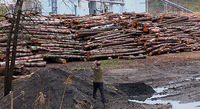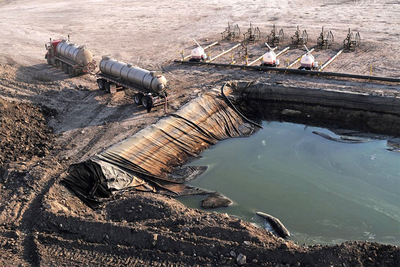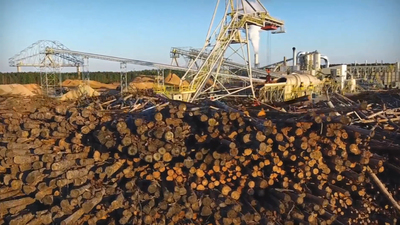Climate Change Alarmism Is No Friend to Ethanol
Originally Published 2020
Sorting the wheat from the chaff
By Marc J. Rauch
Author of THE ETHANOL PAPERS
Exec. Vice President/Co-Publisher
THE AUTO CHANNEL
LEARN MORE:The Auto Channel Green New Deal Archive
 Marc Rauch |
I saw this as a possibility due to the general appalling lack of knowledge of the historical and scientific evidence that proves ethanol's superiority. I've experienced this lack of knowledge with the general public, with our politicians, with media spokespeople, with many in the automotive industry who should know better, and sadly with many of the individuals involved in ethanol advocacy. Yeah, facts can be boring; lots of people hate history. I personally don't feel this way, but as a marketing and advertising expert I've encountered this dislike of information countless times over the years. Relying on terrifying graphical imagery of a world simultaneously flooded by water, yet bone-dry from diabolically rising temperatures is a much preferred way for many people to comprehend where we are and where we're going, even if the vision is false or misleading.
Well, the time has come, someone blew the whistle on Climate Change Alarmism and its comical sidekick, the radical green-at-any-cost movement.
It wasn't The Auto Channel who blew the whistle - Bob Gordon and I have tried, but unfortunately our efforts to do so now seem like we were just wheezing into a whistle's mouthpiece. It took an unlikely source with sufficient hot air to blow the whistle loud enough for the world to take notice. The blowhard in question is filmmaker Michael Moore, and he's the unlikely whistle blower because Moore has been such a heroic figure to those routinely genuflecting at the flag of Anthropogenic Global Warming (AGW) - even though Moore never previously produced a film specifically on the subject.
Michael Moore accomplished the feat by backing a new film called "PLANET OF THE HUMANS." The film is actually the brainchild of Moore's associates, Jeff Gibbs and Ozzie Zehner, but Moore's
hot air is all over it. As I wrote in my review of the film last week, Moore and company has
essentially kneecapped the alarmist climate change and environment movements, and the world is taking notice. For instance, aside from my published review there's now been several other opinion pieces
that echo similar assessment of the film, such as:
Terence Corcoran's "The Hottest Doc Of The Year Kills Green Energy
Valerie Richardson's "Michael Moore turns on climate left with film skewering green energy"
Rowan Dean's video review "Documentary Exposes Renewables 'Great Betrayal' To Green Left"
Terry Glavin's "The Killer Lines in Planet of the Humans"
Bradley Berman's "Environmentalists Demand That Michael Moore’s Anti-EV Film Be Retracted" (The funny part about Berman's commentary is that the film is not an "Anti-EV" film, it's an 'anti-almost every type of fuel and energy' film. Electric cars do get a good drubbing, but only because they deserve it.)
 |
Interestingly, I don't think that Messrs, Moore, Gibbs, and Zehner knew what this film would do to the issues of catastrophic man-made climate change and "Green New Deal" style schemes, nor that the film bites the hands that have fed them so well for so long. I think that Michael Moore's post-premiere efforts to apologize for the film and to try to blame capitalism for luring the alarmists to the "darkside" are a consequence of their misjudgment. I think guys like Al Gore have been corrupt most of their lives, and the objectives were so poorly planned out that regardless of the economic system (socialism, communism, feudalism) under which they plied their scams, the results wouldn't have improved - just look at the horrendous environmental conditions in the glorious (ugh) Peoples Republic of China...cough, cough, cough.
A PAT ON THE BACK, OR A KICK IN THE RUMP
It would be nice to say that Moore and company should be thanked for exposing the duplicity and fraud, but their actions to use capitalism as the scapegoat are reprehensible. If they were acting in good faith they would have simply let the story end with champagne toasts celebrating their coming-of-age realization of the truth (the truth being that we are not facing an apocalyptic end of the world in the foreseeable future, and that people like Gore, Kennedy, McKibbon, Bloomberg, Hayes, Branson, and entities like the Sierra Club have nothing of value to offer, in any event). The film ends with no attempt at solutions, other than implying that the majority of humans on Earth should drop dead.
From my position as a staunch advocate for ethanol, there are two significant downsides to the film: The first is the misuse of buzzwords and commonly used misnomers that make understanding the entire issue very confusing. The second downside is the misinformation leveled at ethanol, which undermines what I (needless to say) believe is the one real solution to most of our pollution woes...some of our health afflictions...and many domestic economic problems. I'll deal with the first downside first; and the second downside second.
Buzzwords and misnomers - The film and the post-commentaries about it (from the right and left) play too fast and loose with wrong or misleading terminology. For example:
Biomass - As I alluded to earlier, the idea that any self-righteous tree hugger would condone the cutting down of forests to fuel any purpose should be the most revolting thing they could imagine. I would reserve the term 'biomass' not for cutting down trees or whole forests, but to indicate decomposing and decaying organic matter; feces and rotting food comes to mind. The film contains a short clip of a zoo where the zookeepers thought that the dung from its resident elephants could be used as the raw material to heat the elephant enclosure. However, the zookeepers sarcastically say they would need lots more elephants. While I believe an elephant's bowel movements to be quite prodigious, I'm thinking more in terms of the waste that comes from humans and their pets on a daily basis. There are perhaps a total of 300-400 elephants in America today. By comparison we have about 330 million people and nearly 180 million pet dogs and cats. Virtually all humans and pets defecate at least once per day...now that's some serious "bio mass." If you're looking for a renewable raw fuel source - rain or shine and regardless of the wind condition - this is it. The overwhelming majority of human waste in developed countries flows into central sewerage and waste treatment plants. As long as it's being collected so efficiently, why not use it for methane and methanol? Pet excrement usually gets picked up, why not deposit it into a separate collectible bin that's sent to the waste treatment plants instead of just tossing it into everyday household garbage cans. To read a pretty good NPR story about this CLICK HERE.
I included the topic of human and pet waste in an editorial I published last June (2019). You can read it by CLICKING HERE.
I'm sure there will be more than one person who will want to point me to some studies that shitcan this concept (pun intended), and that's okay because I would be happy to review them. In fact, I might even review them while in the bathroom contributing to the cause, so to speak.
Fossil Fuels - Fuels produced from crude oil are not "fossil fuels;" they (and coal) do not come from decaying fossils and living materials. They come from minerals. They are "abiotic fuels." The relationship between the term "fossil fuels" and petroleum oil fuels was made by Standard Oil to try to give some romance and dignity to their abiotic fuels. In reality, there is no dignity to these fuels, they are poison. All sides of the energy issue should stop using the term "fossil fuels" and they should use "abiotic fuels" instead (although getting the oil industry to abandon the use would probably require an act of Congress). Gasoline, diesel fuel, propane, natural gas and compressed natural gas, heating oil, and kerosene are abiotic fuels.
Renewables - Renewable energy and fuels are created by man and can be duplicated by man. This primarily includes ethanol, methanol, and hydrogen fuels. Wind and solar power are not renewable energy sources. They do not renew themselves and humans can not do anything to help them to renew. Winds are caused by unequal heating from the sun. The sun is burning itself out (yes, we will probably never see this happen, nor will our grandchildren or great-great-great grandchildren - but it will happen).
A much better all encompassing term for solar and wind energy is "NATURAL ENERGY" or "NATURALS" for short. (A colleague doesn't like the word "natural" because he thinks it's tainted by misuse related to the labeling of natural food and other natural products. That's a good point, so then maybe "UNIVERSAL ENERGY" or "UNIVERSALS" is better.) In any event, Naturals or Universals should be used, and the term would include water power and geothermal power.
Technically, wood falls in the renewable category. The problem, however, is the time it takes to renew or regenerate wood. Corn grown for ethanol will reach its full maturity in one year's growing season. Some energy crops have more than one growing/harvesting season in a year. Seaweed can grow 18 inches per day. In ten days, seaweed can grow 15 feet. If you chop down a 15 foot tree it could take 5 or 10 years to replace it. I'm not a tree-hugger in the neo-traditional sense, but if you're gonna cut down a tree it should be used to build something of lasting value to humans or animals (i.e., a shelter). If you're cutting down the tree to turn it into wood chips to burn in order to power a generator or boiler (and you live in a developed country), just leave it the hell alone.
 |
Alternatives - Alternative energy and fuels can include renewables and naturals and anything else that doesn't fit squarely in the abiotic category. The odd duck is nuclear energy because while it's an alternative to the traditional abiotics, its base source materials (uranium, plutonium or thorium) are abiotic.
Raw Energy vs Usable Energy - All usable energies and fuels require great amounts of raw energy and fuels. ALL. Some usable energy and fuels may require less input energy and fuels than others, but they ALL require great amounts of raw energy. So it should never come as a surprise to anyone, anywhere, that there is no magical wand and no free lunch. Even in an asinine dytopian world where mass numbers of humans replace mechanical devices to accomplish tasks, the human machines require fuel, typically multiple times a day. This fuel is basically food. Producing this fuel requires enormous amounts of energy. Obviously, if we can create usable energy without killing millions of animals, or starting wars, destroying bucolic environments, or enslaving people to mine raw materials it would be good and moral and peaceful. With this in mind, we should immediately work to eliminate virtually all abiotic fuels and any fantasies of electric vehicles (until and unless all the issues related to electric vehicles are truly worked out). This will probably mean that many California politicians will have to forego whatever untold-riches and baksheesh they were expecting from China, but that's too damn bad. We don't need electric-powered vehicles; there's nothing wrong with internal combustion engines that a cleaner, safer, healthier fuel won't fix.
The instructive thing in all this is that we should have more clarity in how we communicate ideas about energy (it makes a good life lesson, too). Allowing conmen flim-flam artists - or should I say "film-flam" artists - to misuse such a lovely optimistic word like biomass should never be tolerated.
Ethanol Misinformation - Hey, ethanol production requires raw energy, it's a fact! But ethanol fuel production in America today is energy positive, while gasoline is energy negative. Moreover, no American service man or woman has ever died defending ethanol production or any foreign ethanol producing nation. I don't believe that any aircraft carrier has ever been built to protect the passage of harvested energy crops to distillation plants. No ethanol spills have ever resulted in ecological disasters that kill millions of birds, mammals, and fish. And while it is true that abiotic fuels are often used to power the machinery needed to create energy crops and distillation, the use of abiotic fuels can be entirely eliminated and replaced with cleaner, safer, healthier alcohol-based fuels.
Planet Of The Humans doesn't focus on ethanol and alcohol fuels. It makes some vile references and innuendos about ethanol, primarily by incorrectly lumping ethanol fuel together with the repulsive idea of horse fat and alligator fat biofuel.
This is what a corn field looks like:
This is what a petroleum fracking field looks like:
This is what a "green energy" Gore/McKibbon-type woodchip enterprise results in:
Algae, kelp, and seaweed represent a great potential for ethanol production. Because of seaweed's rapid growth, one acre of saltwater seaweed can yield up to 30,000 gallons of ethanol in a year (an acre of corn can yield 300 to 400 gallons of ethanol per year). Just after showing scenes related to horse fat and alligator fat biofuels, the film cuts to a scene of a white-coated General Electric spokesman who announces that he believes that liquid fuels and chemicals will have to eventually be made from sustainable raw materials. He says, "We believe that seaweed is one of the most attractive opportunities." The film then cuts to a beautiful underwater scene of seaweed and seahorses, and the narrator (Jeff Gibbs) wistfully intones, "Better hurry, one year after it was filmed, this seaweed forest was dead."
It sure looks and sounds ominous, but I'm unaware of any alligator or horse fat biofuels being pumped at filling stations, and the location of the underwater scene is not identified...nor is the "seaweed forest dead." As I write this, and you read this, seaweed is growing like a weed on steroids in the oceans and seas all around the world. Making it seem as if ethanol has killed off any seaweed forests is as fraudulent as Michael Moore's claim that capitalism is to blame for Al Gore being a hypocrite rat, or his recent anti-Trump rant that Trump has wrongfully trademarketed "Central Park" (thereby depriving the City of New York from using the name. There are currently 9 different live Federal trademarks with the two words "Central" and "Park," and about a dozen more trademarks that use "central" and "park" as key words in their marks, such as "Central Park West"). Even if one of Donald Trump's companies own (legally own) a trademark that uses the words Central Park, so what?
Meanwhile, I'm trying to figure out what the heck a GE spokesman is doing talking about this subject. I've been covering ethanol and biofuels for many years and I've never come across any GE information of value related to ethanol since the company's co-founder Elihu Thompson gave testimony at the 1906 Free Alcohol Congressional Meetings. I am very aware of Exxon-Mobil's misguided attempts to encroach on the algae-biofuels space with what I've suspected is their hope to patent a super-algae formula. Algae doesn't need a super formula to grow, but that's another story.
The unfortunate end result of these aspersions is that ethanol is tarred and feathered alongside all of the harebrained scams created by Gore, McKibbon, the Koch brothers, Khosla, Bloomberg, the Sierra Club, and the rest of the film's skewed contingent. The problem is that I haven't seen where anyone in the ethanol industry has tried to correct these outlandish comments.
What I've encountered over the last few years are several so-called environmental organizations making bewilderingly stupid anti-ethanol misrepresentations. I've argued that these green entities are really just fronts or financial partners of anti-ethanol groups. Last December, I was challenged on this point by Marlo Lewis, Jr., bedfellow of the oil industry and long time ethanol basher. My published reply to Lewis enumerated multiple examples to prove my point, and now Michael Moore's new film provides the icing on that cake. You can read it by CLICKING HERE
Some ethanol advocates bought into the ideas of catastrophic man-made climate change and extreme environmental movements either because they believed in the underlying information or because they believed that by doing so that it would help sell the idea of ethanol fuels, or both. With the revelation that the people and the "science" behind both movements are liars and frauds, the affected ethanol advocates now have to contend with increased hostility from ethanol opponents plus the duplicitous backstabbing by the alarmist leaders who have been concocting and spreading lies against ethanol because ethanol is a threat to their own scams. With friends like the scammers involved in AGW and Green New Dealing, the ethanol industry will never be short on enemies. The difficult task is identifying and retaining real friends.






